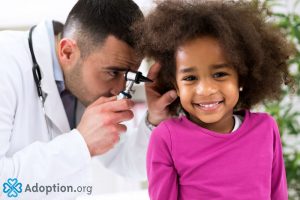International adoption made us first time parents. Before we traveled, we eagerly soaked
up our friends’ wisdom on the best bottles, the best pediatric dentists, the best playgrounds
and splash parks, and the best deals on diapers. But when it came time to choose a
pediatrician, we turned to our adoption agency.
Children who have spent time in an orphanage or institutional care have different needs
than children who have resided with their parents since birth. Developmental delays are
common, mental and emotional needs are complex, and poor or malnutrition may present
itself. When we returned home with our son, we knew we would need a doctor who
understood the complexities of our son’s first years of life —but where to begin?
A quick survey of Google yielded few results, so I turned to our agency and other
adoptive parents. Like any doctors, the best way to find a good one is to get a referral.
Our agency recommended a doctor at the John Hopkins International Adoption Medicine
Center, so we decided to start there. If your agency does not offer a recommendation,
there are many adoption groups on Facebook that offer a wealth of information and
referrals.
The next step is to interview your child’s potential doctor. Does he have a knowledge of
your child’s country of origin? Has she worked with children from that region before,
and if so, how frequently? Our doctor was able to provide a comprehensive list of which
diseases, infections, and genetic mutations are common to our son’s area of China. She
was able to interpret his medical files, immunization records, and in-country doctor’s
notes. And because she was familiar with China, she was able to interpret their medical
terminology in a way my uncle (a U.S. ER doctor) could not. Step by step, she walked us
through everything and at the end provided us with a modified developmental chart of
where we could expect our son to be verbally, cognitively, and physically given his time
in institutional care.
But even if you have a great interview, you should do your homework. Read up on the
doctor and see if he has published any articles (which can be a great resource for
adoptive parents). Ask adoptive friends (either in person or through social media) if they
have experience working with this doctor and what their impressions are. How quickly
does the doctor respond to questions? What is the turnaround time like for her lab work?
How easy is it to get an appointment or speak with a nurse in case of an emergency?
Adoption doctors are a necessity when you come home with your new child, but they can
be an asset as you begin the adoption process, as well. For us, the same doctor was able to
review our son’s initial referral and give us questions to further assess his special need.
When it came time to travel, our doctor helped us with prescriptions for both us and our new
child, and when we returned home, she was the first appointment we made.
Still unsure where to start? A comprehensive list of adoption doctors recommended by
the American Academy of Pediatrics can be found here.
Jennifer S. Jones is a writer, performer, storyteller and arts educator. She holds an MFA (Playwriting) from NYU Tisch. She has written numerous plays including the internationally renowned, award-winning Appearance of Life. In a small government office in China, Jennifer became an adoptive mother. She is passionate about the adoption community and talks about the ins and outs, ups and downs, joys and “is this really us?!?” whenever she can. She writes about her experiences at <a href=”//www.letterstojack.com/”>www.letterstojack.com</a>.
